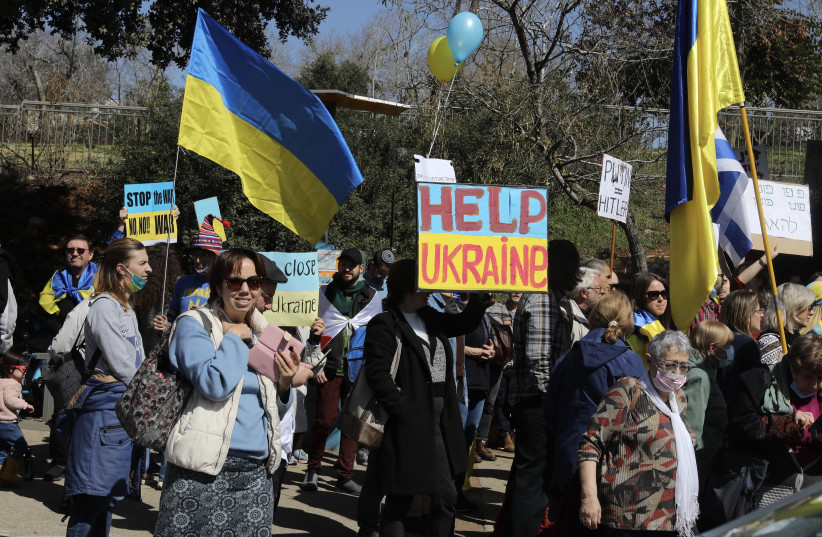From rabid anti-Israel vilifiers like the Electronic Intifada’s Maureen Clare Murphy, to more genteel prime-time Israel bashers like MSNBC’s Mehdi Hasan, pro-Palestinian propaganda warriors are using Russia’s invasion of Ukraine to try and score points against Israel.
“If you’re a Western liberal sympathizing with Ukrainians taking up arms against Russia right now, ask yourself why [you] haven’t sympathized with Hamas fighters in Gaza or Hezbollah in Lebanon,” tweeted Murphy in a post representative of this thinking.
And Hasan had this gem of sarcasm to offer last week after Foreign Minister Yair Lapid condemned the Russian attack on Ukraine as a “severe violation of international order”: “Who better to denounce wars of aggression and illegal occupations... than the foreign minister of Israel.”
Only those most gullible, ignorant of history, or consumed by a hatred of the Jewish state could confuse Hamas and Hezbollah – groups whose claim to fame is suicide bombers and rockets on civilian population centers – with brave Ukrainians fighting Russian forces.
Only the severely context-challenged could compare Israel’s wars of defense to Russia’s invasion of its neighbor.

As to Hasan’s “illegal occupation” reference, it is worth noting that Israel has been trying for the last half-century to figure out a way to end the “occupation” – one forced on it during a war it did not choose – and stay alive. Because of unrealistic Palestinian demands, as well as a greater Palestinian interest in dismantling the Jewish state than in actually building a Palestinian one, that formula has remained painfully elusive.
All those trying to paint Israel as imperialist Russia and the Palestinians as the freedom-seeking Ukrainians should keep a couple of truths in mind:
First, the Ukrainians never tried to throw the Russians into the Black Sea, nor does the Ukrainian constitution include a clause stating that Russia has no right to exist.
Second, the Ukrainians did not arm their people with explosive vests and encourage them to ride buses in Moscow and blow themselves up along with as many innocent passengers as possible.
Third, the residents of Kharkiv in northern Ukraine have not been firing rockets for nearly two decades at apartment blocks in Belograd just across the border.
To compare Russia’s full-scale invasion of Ukraine to bring Kyiv under Russian President Vladimir Putin’s heel to Israel’s incursions into Gaza or southern Lebanon to stop Hamas or Hezbollah from randomly shelling civilian populations is to willfully distort reality.
Thankfully, most reasonable people see these lies for what they are.
Sadly, some will only see that the Russians are the far stronger side in this war, that Israel is the far stronger side when it fights Hamas in Gaza, and reflexively just sympathize with the underdog, the weaker side.
Weakness, however, does not automatically bestow virtue. In the Ukrainian-Russian conflict, it happens to be that Ukraine is both the wronged party and the weaker one. But that is not the case with the Palestinians.
Along with a facile understanding of history, those trying to weaponize the Russian-Ukrainian war against Israel are also guilty of hypocrisy. Many of those same people decrying Russia for trying to take over another country are quiet when it comes to Iran doing the same thing.
In an astounding display of inconsistency, many in the US and Europe are clamoring for tougher economic sanctions against Russia, while cheering on those who would remove tough economic sanctions against Iran to enable a new nuclear deal with that country.
Russia is trying to destroy one country in its neighborhood. Iran has already destroyed several countries in its region – Yemen, Lebanon, Syria, and it’s working on Iraq. Unlike Iran, Russia has not pledged to wipe out a country just 2,000 km away, as Iran does repeatedly when it comes to Israel.
Rather than having Western liberals ask themselves, as Murphy did in her astonishingly obtuse tweet, why they are not siding with Hamas and Hezbollah as they do with the Ukrainians, what they should really be asking themselves is: why are they not as concerned about Iran’s quest for regional hegemony and domination as they are of Russia’s?
